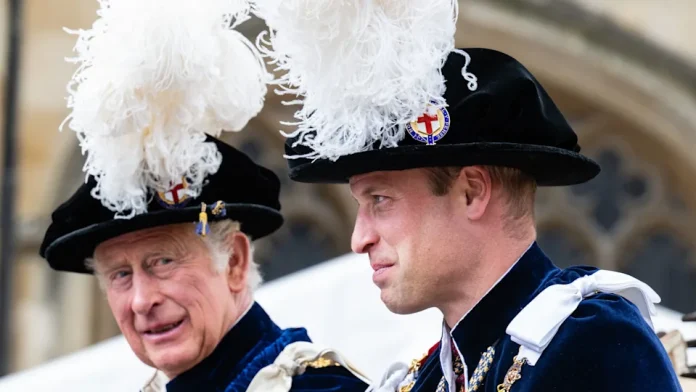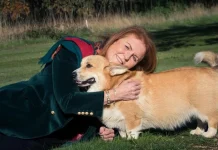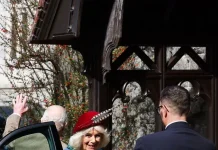The Prince of Wales will kneel to pay homage to his father the King at the coronation next week, following in the footsteps of his grandfather the late Duke of Edinburgh, who famously swore to be Queen Elizabeth II’s “liege man of life and limb” during her ceremony in 1953.
Prince William will place his hands between those of his father to say: “I, William, Prince of Wales, pledge my loyalty to you and faith and truth I will bear unto you, as your liege man of life and limb. So, help me, God.”
The heir to the throne is the only member of the royal family who will pay “The Homage of Royal Blood,” also described as the “words of fealty”, after the Archbishop pays his own homage on behalf of the Church of England.
The new details are contained in the specially commissioned Coronation liturgy, shared by Lambeth Palace ahead of the ceremony on 6 May. The liturgy follows the theme of “loving service” and contains a number of new elements in a ceremony that otherwise follows a format used for more than 1,000 years.
In a break with centuries of tradition, the homage of peers, which was last carried out at the 1953 crowning of Queen Elizabeth II, has been replaced by a Homage of the People. Those watching and listening at home or elsewhere will be invited to join in the homage, which reads: “I swear that I will pay true allegiance to Your Majesty, and to your heirs and successors according to law. So, help me, God.”
The Archbishop of Canterbury will say: “God Save the King,” to which the people will reply: “God Save King Charles. Long Live King Charles. May the King Live forever.”
In an update to reflect the diverse makeup of modern Britain, before the King’s Oath to uphold the law and the Church of England, the Archbishop will say that the church will “seek to foster an environment in which people of all faiths and beliefs may live freely”. The new words reflect the King’s longstanding support of interfaith relations and his desire to make his reign as inclusive as possible.
For the first time in coronation history, items of the Regalia – those with no Christian meaning or symbolism – will be presented by members of the House of Lords from different faith traditions including Judaism, Islam, Hinduism and Sikhism. In a third nod to inclusivity, as the King prepares to depart the Abbey, he will receive and acknowledge a spoken greeting delivered in unison by representatives from Jewish, Hindu, Sikh, Muslim and Buddhist communities.
And in another first, Prime Minister Rishi Sunak, a Hindu, will give a reading on the theme of “loving service”. It will be the first time a Prime Minister and a non-Christian have done this at a coronation. The King’s own faith will also be on display as he becomes the first monarch to pray aloud in front of the congregation when he says a personal prayer, written especially for the occasion, after making his oath.
His prayer will “reflect the duty and privilege of the Sovereign to serve all communities”. In his own Oath, King Charles will promise to uphold the law and the Church of England before placing his hand on a specially commissioned bible to say: “I Charles do solemnly and sincerely in the presence of God profess, testify, and declare that I am a faithful Protestant and that I will, according to the true intent of the enactments which secure the Protestant succession to the Throne, uphold and maintain the said enactments to the best of my powers according to law.”
Elsewhere, female bishops including Dame Sarah Mullally, Bishop of London, The Rt Revd Rose Hudson-Wilkin, Bishop of Dover and the Bishop of Canterbury, and The Rt Revd Dr Guli Francis-Dehqani, Bishop of Chelmsford, will play a role in the Coronation Service for the first time in history.
The different languages of the British Isles will also be used in the service for the first time, with a prayer in Welsh and a hymn, Veni Creator, sung in Welsh, Scottish Gaelic and Irish Gaelic. At the opening of the Coronation Service, The King will be greeted at Westminster Abbey by Samuel Strachan, age 14, who is the current longest-serving chorister of the Choir of His Majesty’s Chapel Royal at St James’s Palace. Samuel has sung with the Choir for four years and is a student at the City of London School.
In a statement, the Archbishop of Canterbury, Justin Welby, who is responsible for the new liturgy, said: “I am delighted that the service will recognize and celebrate tradition, speaking to the great history of our nation, our customs, and those who came before us. At the same time, the service contains new elements that reflect the diversity of our contemporary society. It is my prayer that all who share in this service, whether they are of faith or no faith, will find ancient wisdom and new hope that brings inspiration and joy.”
A spokesman for Lambeth Palace said: “These new elements have been chosen to express the theme of loving service that lies at the heart of the Christian faith and contemporary Monarchy, and to represent and celebrate the diversity of our nation today.”












